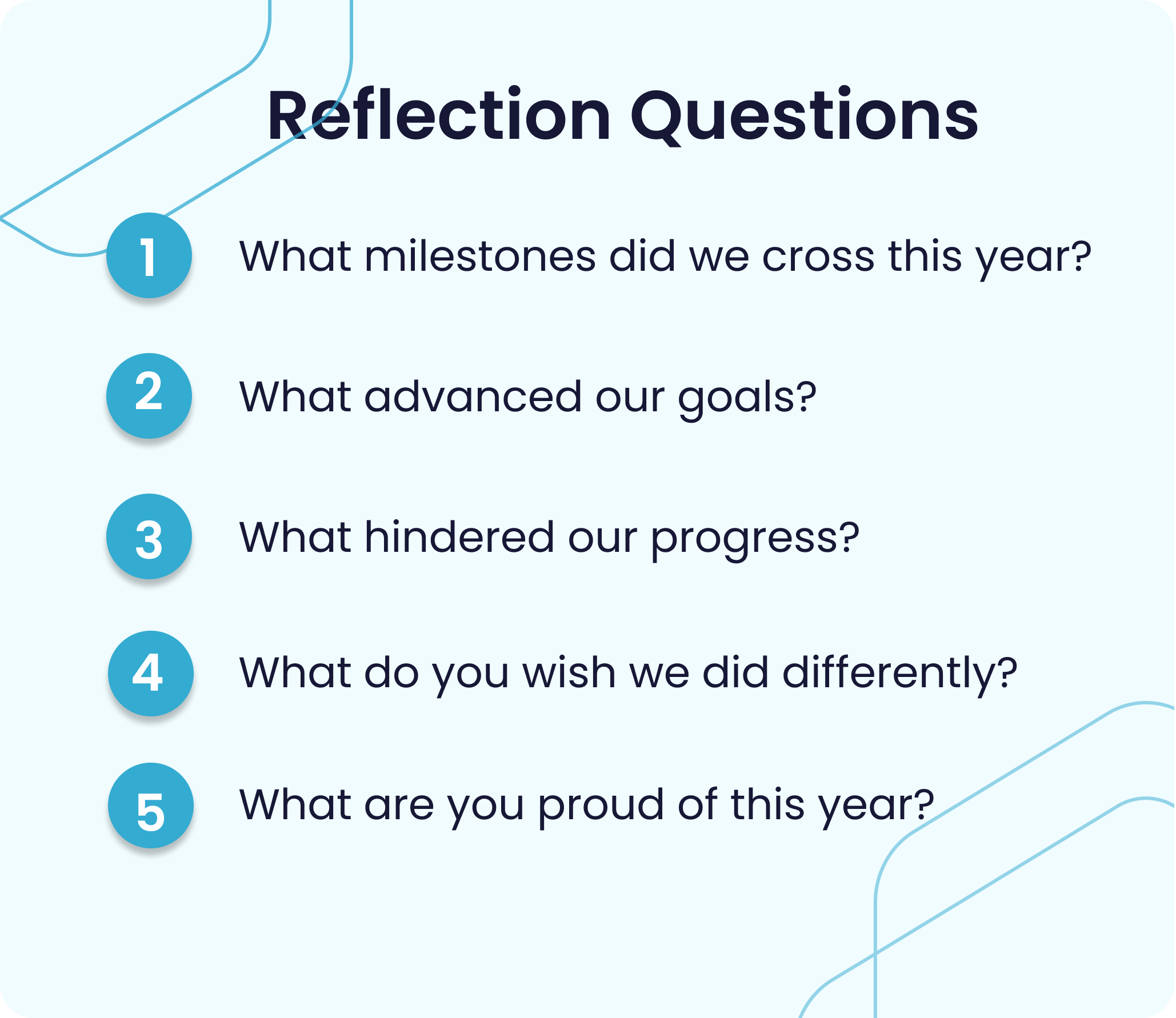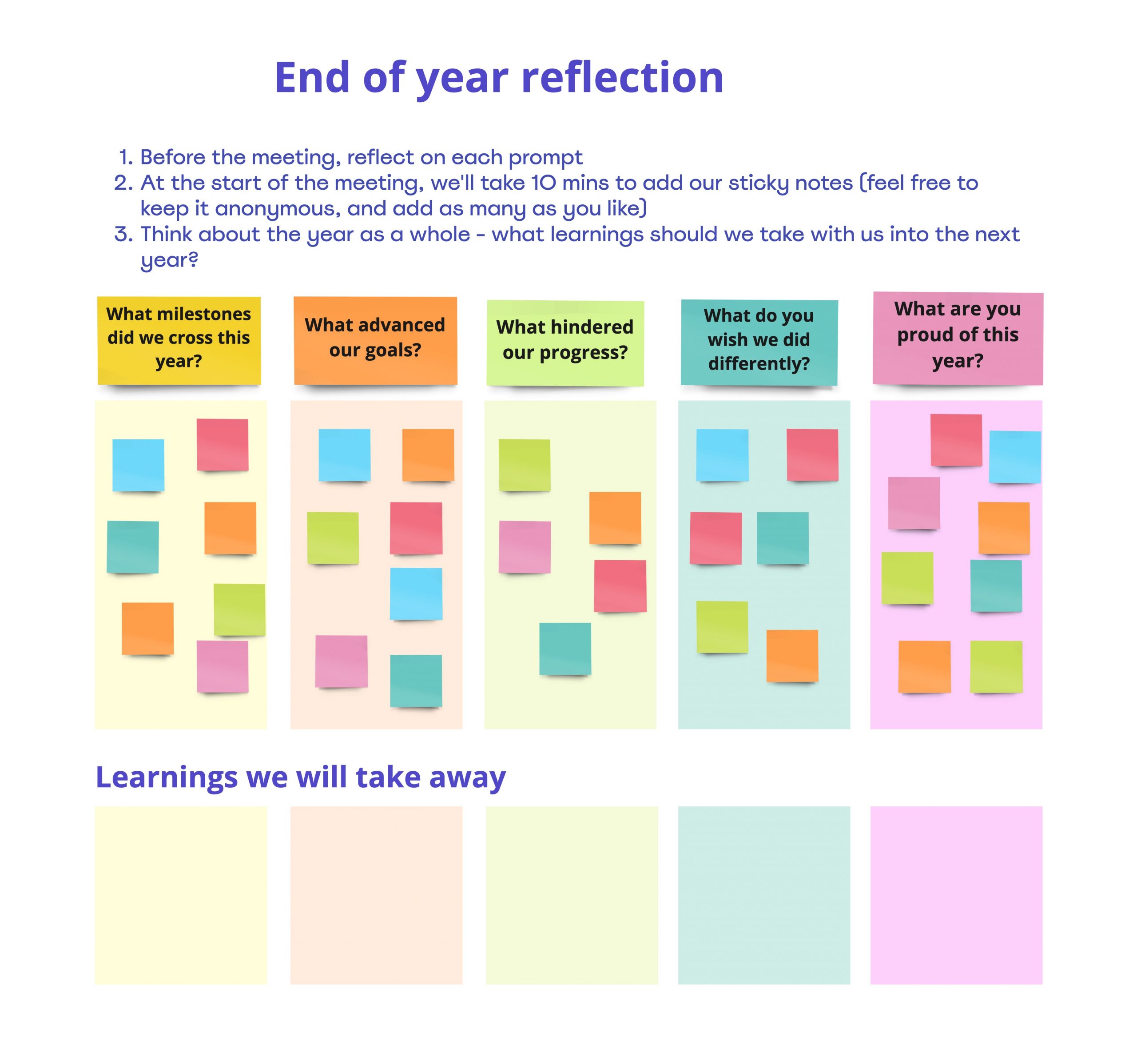How To Reflect, Celebrate and Recharge With Your Team

The year is drawing to a close. It’s time to take stock of the past 12 months and plan for the next. Here’s how to transition into 2023 full of energy by helping your team to reflect, celebrate and recharge.
2022 has been a whirlwind of a year. Whether you’re readjusting to the return of office life or fine-tuning your newly permanent remote set up, this year has brought plenty of unique challenges.
And that’s not to mention the stress of economic uncertainty. Many tech companies are already feeling the effects. With a bout of recent redundancies, employers are asking how to support their team when there’s a general feeling of stress in the air.
Even though a recession looks to be on the horizon in the UK, there’s no excuse to put employee well-being on the back burner. Just look to the past for evidence.
During the 2007-2009 recession, stock prices of companies that prioritised diversity and inclusion actually gained an average of 14.4%. In these companies, workers reported feeling welcomed and valued, people processes were fair, and underrepresented groups were supported.
This post offers some tips to support your team and foster connection during an uncertain time, but to build a truly resilient workforce, you need a holistic DEI strategy.
Needless to say, there’s plenty of learning to be harvested from the past year. To properly internalise them, we need to pause and reflect.
The most resilient teams are able to reflect on the past in order to prepare for the challenges ahead. That means celebrating the highs, talking openly about the lows, and giving yourself space to rest.
Here’s how to reflect, celebrate & recharge as a team.
1) Reflection: Review the year as a team
Reflection is a healthy habit to have. Research shows that reflection is essential for growing soft skills. It helps us to honestly interrogate our behaviour and figure out what worked and what didn’t.
Did you know? There’s plenty of evidence that reflexive teams are more innovative, creative and productive. Google even allots 20% of employees’ working hours to purely creative work to encourage people to think outside of the box.
In other words, you certainly shouldn’t limit your team-wide reflections to once per year. But it also helps to look back on the year as a whole so you can put your experiences into context.
In the final month of the year, set aside some time to review your experiences as a team. Here are some questions to guide you:

Here’s how to run your session:
- Prepare a Miro board with your reflection prompts and send it to employees in advance, asking them to think through the prompts before you meet.
- Start the meeting by giving everyone 10 minutes to add (anonymous) sticky notes to the prompts.
- When the time is up, nominate someone to group sticky notes into common themes for each prompt.
- Talk through the themes within each prompt, allowing people to elaborate or respond.
- For each theme, summarise one thing you’ll take away as a learning. For example, “This year, our team had several priorities at the same time, which meant that work sometimes felt disjointed. In order to work more harmoniously next year, we’ll rank priorities and use weekly async updates to keep everyone aligned.”
At the end of the session, you should have a web of reflections that map out your team’s experiences across the whole year. Take this souvenir with you into the new year so you can continue to grow.

2) Celebration: Share your appreciation
What motivates people at work? If this was a question on Family Fortunes, you might guess the top slots would be salary, success, progression… But did you know that appreciation is high on the list?
Did you know? We all place a high value on recognition from our peers. 78% of workers agree that more recognition would motivate them to work harder.
Symbolic rewards have a powerful impact. One study found that offering a congratulatory card can boost performance by 12%. Another study found a positive impact on retention when new joiners received recognition for their achievements. That’s a huge impact for zero cost!
To boost feelings of appreciation, get together and celebrate as a team. It’s a more inclusive ritual than typical Christmas holiday parties, which might exclude people from different religions and cultures. When you celebrate the team as a whole, everyone can get involved.
Tip for managers: Give ‘thank you’ notes
- Employees who receive a simple, hand-signed letter of appreciation feel significantly more recognised, valued and motivated. Give your holiday cards a little more flair this year with short but genuine “thank you” notes.
- Be specific – whether it’s helping onboard a new teammate or stepping in to deliver a last-minute presentation, reference something your report did this year that you appreciate.
Tip for teammates: Appreciation exchange
- Give your Secret Santa a twist this year. Instead of gifts, share heartfelt notes of appreciation.
- It’s easy to set up – with apps like Elfster or DrawNames, all you need to do is enter the names of your teammates and they’ll take care of the rest.
- Share some prompts to give people inspiration for their notes: “What’s one thing X did this year to support your or the team? Describe one time they really wowed you this year.”
3) Recharge: Support healthy work-life balance
Taking time off does wonders for our stress levels, mindfulness, brain power, even our sleep. In fact, one study found that for each vacation taken, our risk of health issues related to heart disease goes down by a quarter.
Did you know? Supporting healthy work-life balance in your company is also a strategy to invest in diversity long-term.
In their book Getting to Diversity, Dobbin & Kalev note that underrepresented groups are more likely to experience external pressures on their work-life balance. Studies found that supporting work-life balance policies like flexible hours and paid leave has positive effects on ethnic and gender diversity.
In the UK, the end of the year is typically thought of as the time to rest and recharge. But that’s not possible for all companies and job roles. If it’s not feasible to give everyone a set period of time off over the holidays, reinforce the value of work-life balance and support employees in taking time off.
Here’s how:
- Review how much leave people have takenBefore the year closes, review how much annual leave each person has taken. If there are any large discrepancies, encourage employees to book some time off in the next few weeks.
It’s good for your bottom line too — 75% of HR professionals report that employees who take most or all of their vacation perform better than others.
- Help employees feel able to take time offWe might be feeling the end-of-year crunch, but overworking shouldn’t seep into your habits. After all, there’s no evidence that working extended hours increases productivity, and it can easily lead to burnout.
Employees might be reluctant to take time off if they feel their job performance will suffer. To alleviate their worries, managers should plan in advance, manage workloads and redistribute tasks so that employees can properly disconnect.
Whatever 2022 had in store for you, taking a step back can help you put it all in perspective. Doing so as a team will remind you of all the ways you’ve grown and supported each other, solidifying your bonds.
If you’re already planning your goals and objectives for 2023, is DEI on your agenda? To kickstart your work, check out our guide on setting excellent DEI goals. It’ll help to align your team and propel your efforts. Let’s make 2023 the most diverse, inclusive and equitable year yet. 😉
Backing it up
Castrillon, C. (2021) Why Taking Vacation Time Could Save Your Life. Forbes
Bailey, J. R. & Rehman, S. (2022) Don’t Underestimate the Power of Self-Reflection. Harvard Business Review.
Dobbin, F., & Kalev, A. (2022). Work-life Help For Everyone. In Dobbin, F., & Kalev, A. Getting to diversity: What works and what doesn’t. (pp.130-153) Harvard University Press.
Gallus, J. (2017). Fostering public good contributions with symbolic awards: A large-scale natural field experiment at Wikipedia. Management Science, 63(12), 3999-4015.
Kosfeld, M., & Neckermann, S. (2011). Getting more work for nothing? Symbolic awards and worker performance. American Economic Journal: Microeconomics, 3(3), 86-99.
Piasna, A., & De Spiegelaere, S. (2021). Working time reduction, work-life balance and gender equality. Dynamiques regionales, 10 (1), 19-42.
Rothbard, N. P., Beetz, A. M., & Harari, D. (2021). Balancing the scales: A configurational approach to work-life balance. Annual Review of Organizational Psychology and Organizational Behavior, 8, 73-103.
Shin, Y., Kim, M., & Lee, S. H. (2017). Reflection toward creativity: Team reflexivity as a linking mechanism between team goal orientation and team creative performance. Journal of Business and Psychology, 32(6), 655-671.